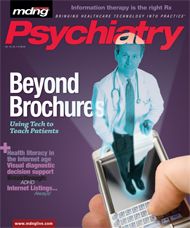The World Beneath: Modern Psychiatry and the Folly of Self-diagnosis
A patient recently sent me an e-mail explaining that, after consulting with her spouse and parents, she had changed her mind about taking the medication we discussed during her appointment.
A patient recently sent me an e-mail explaining that, after consulting with her spouse and parents, she had changed her mind about taking the medication we discussed during her appointment. She had reviewed the DSM criteria and was confident that she had bipolar disorder, despite my conclusion that her symptoms were not consistent with that diagnosis. I would guess this situation happens more often in psychiatry than in other specialties; it’s hard to imagine a patient, after being told that he has coronary disease, discussing the diagnosis with family members and concluding that he instead is experiencing esophageal spasm.
This phenomenon of psychiatric self-diagnosis is especially strange when one considers that psychiatry is among the most complex and least understood medical specialties. Given that psychiatric experts have trouble making consistent diagnoses, what are the chances that people with no psychiatric training are going to get the diagnosis right?
A common counterargument holds that knowing a person for a lifetime provides a more complete picture than can be obtained through short-term observation by an outsider. However, a patient’s long-term history is valuable only if seen through an impartial lens, as opposed to the distorted view of family members. The patient’s medical records are far better sources of information for a diagnosis that requires remote history. This “closeness” effect is due not only to the distorted perspective of the close observer, but also because the person being observed will act—and feel—differently depending on who is watching. Psychiatric symptoms are strongly influenced by the nature of the relationship between the observed and the observer.
Further, it is considered unprofessional for a psychiatrist to diagnose and treat a close family member, and no court would consider testimony valid that comes from a psychiatrist who had a personal relationship with his or her patient. Yet, laypersons cling to the idea that the closer one is to a person, the better one knows that person, putting them in a better position to make a diagnosis than a psychiatric expert who has only known the patient for a short time.
It is difficult to address this situation with patients without arousing anger. A patient who is told to trust his doctor over his family is likely to see the doctor as arrogant, or even insulting to his family. Likewise, family members in such a situation are going to do all they can to get their loved one away from “that crazy psychiatrist” who is making an uninformed diagnosis.
We see ourselves as we want to see ourselves, or more specifically, as we have been told to see ourselves over many years by those close to us. This misperception is why diagnosis by family committee is pure folly. Families see a family member as they want to see him—and as they need to see him. On the other hand, an impartial, practiced observer can see the patient/family member as he truly is, making such an observer a threat to the family’s tightly held opinions.
I often write about the deficiencies of modern psychiatry that result from too-short encounters between psychiatrists with their patients. Psychiatric care would be more effective if patients understood the phenomenon that I just described, but discussing this with patients and families who are sure that they know the true diagnosis takes a great deal of time to convince them otherwise. We all went into medicine to do the right thing. We take an oath to first do no harm, and the medications used to treat bipolar disorder affect multiple organ systems, so it is important that we get the diagnosis right. And so, I am left with a question: When a patient comes into my office and I need to spend 60 minutes explaining this phenomenon in order to have any hope for compliance with treatment, what should I use as the billing code?
Dr. Junig is a board-certified psychiatrist in solo practice in Wisconsin, an assistant clinical professor of psychiatry at the Medical College of Wisconsin, and medical director of Nova, a residential AODA treatment center.
